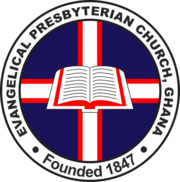|
Evangelical Presbyterian Church, Ghana
The Evangelical Presbyterian Church, Ghana (Ewe: Presbyteria Nyanyui Hame le Ghana) is a mainline Protestant Christian denomination in Ghana. It is popularly referred to as the "EP Church". It has strong roots in the Evangelical and Reformed traditions. The denomination's Presbyterian sister church is the Presbyterian Church of Ghana. HistoryThe Evangelical Presbyterian Church Ghana was founded by German missionaries on 14 November 1847 in Peki.[1] These missionaries from the North German Mission Society (Norddeutsche Mission, Bremen), together with the Basel Mission in 1847, started work among the Ewe people in what is now the Volta Region of Ghana. By the beginning of World War I, they had established two mission stations in the British colony of the Gold Coast and seven in the German territory of Togoland. The first of the mission stations was (Mission-Tove) in present-day Togo.[2] After the war, Togoland was divided into two territories, the western one under British rule and the eastern one under French rule. The first synod of the mission stations in May 1922, despite the division of Togoland, declared itself to be the supreme governing body of the "Ewe Church". The church adopted the congregational order of the Bremen Mission. In 1923, Scottish missionaries began working in British Togo (Transvolta Togoland), which is the present-day Volta Region of Ghana. The church in French Togoland (now Togo) was run by the Paris Mission. As a result, development proceeded separately in the two territories, although both churches share the same constitution. They hold a common synod meeting every 4 years.[3] Church informationModerator of the General AssemblyThe overall leader of the church is known as the Moderator of the General Assembly.[4] The current Moderator of the General Assembly of the church is Reverend Lt. Colonel Bliss Divine Kofi Agbeko. He was inducted in January 2021 at the Dela Chapel of the church at Ho.[5] Past Moderators of the General SynodThe previous gathering of the churches was known as the General Synod. The first Moderator was elected in 1922, when the Togo and Gold Coast branches of the church held their first Joint Synod.[6] The last Moderator of the General Synod was Rt. Rev. Dr. L.K Buama, whose term ended in 2009.[7]
Past Moderators of the General AssemblySince 23 August 2008, the church changed from Synod status to General Assembly status. Since then, the Moderator is now officially known as 'The Moderator of the General Assembly'. The first Moderator since this change was the Very Reverend Francis Amenu.[8] Rev. Seth Agidi, who succeeded him, died in office after a short illness at the Ho Teaching Hospital on 10 October 2020.[9]
Past Synod Clerks
Education The church is active in education and has established numerous primary and secondary schools, and a university college.[13][14] They include:
HealthThe EP Church has also been active in providing health care.[14] Its facilities include:
Associations
MissionariesOne of the last missionaries to work with the Presbyterian church was Ian Strachan of the Church of Scotland. He was also the first headmaster of the E. P. Senior High School at Hohoe.[18] Partner churches
See also
References
External links and sources
|
||||||||||||||||||||||||||
